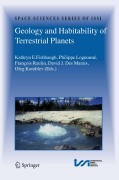
Given the fundamental importance of and universal interest in whether extraterrestrial life has developed or could eventually develop in our solar system and beyond, it is vital that an examination of planetary habitability go beyond simple assumptions such as, "Where there is water, there is life". This book has resulted from a workshop at the International Space Science Institute (ISSI) in Bern, Switzerland which brought together planetary geologists, geophysicists, atmospheric scientists and biologists to discuss the multi-faceted problem of how the habitability of a planet co-evolves with the geology of the surface and interior, the atmosphere, and the magnetosphere. Each of the six chapters have been written by authors with a range of expertise so that each chapter is itself multi-disciplinary, comprehensive, and accessible to scientists in all disciplines. These chapters delve into what life needs to exist and ultimately to thrive, the early environments of the young terrestrial planets, the role of volatiles in habitability, currently habitable (but possibly not inhabited) geologic environments, the connection between a planet’s inner workings and the habitability of its surface, and the effects on planetary atmospheres of solar evolution and the presence or absence of a magnetosphere. This book serves as an ideal reference for those planning missions that will hunt for biomarkers (especially on Mars), for biologists and geoscientists seeking the other side of the story, and for researchers and upper level students interested in an in-depth review of the geologic evolution of terrestrial planets, from their cores to their magnetospheres, and how that evolution shapes the habitability of the planetary surface.
- ISBN: 978-0-387-74287-8
- Editorial: SPRINGER VERLAG WIEN.
- Encuadernacion: Rústica
- Páginas: 310
- Fecha Publicación: 28/11/2007
- Nº Volúmenes: 1
- Idioma:
